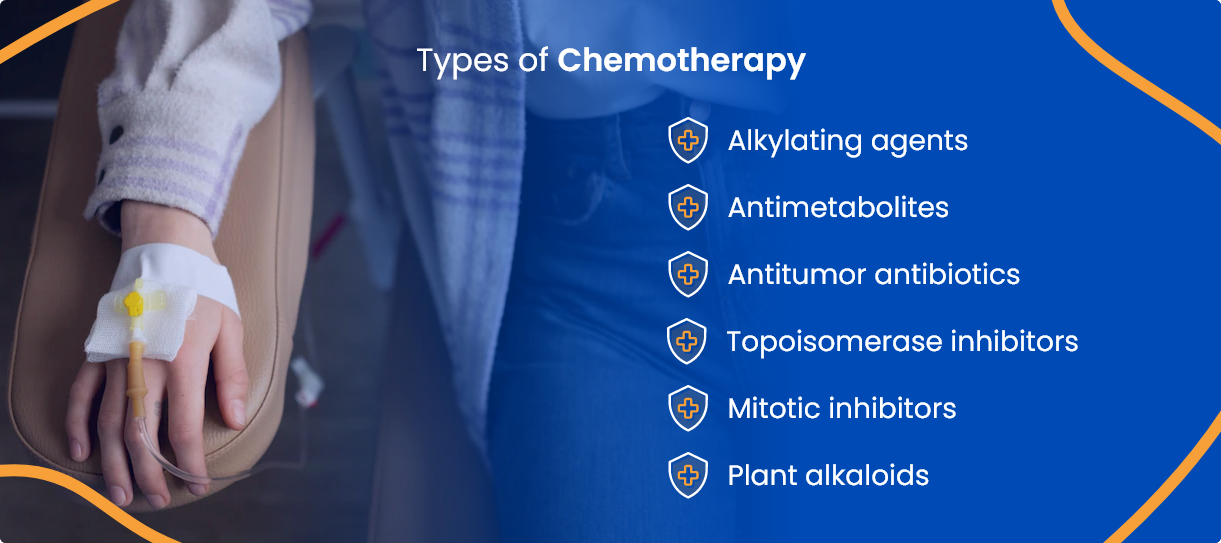
Book a Consultation
Thank you!
Your form has been sent successfully.

Chemotherapy (chemo) uses strong medicines designed to kill rapidly dividing cancer cells. It is a common part of cancer treatment because cancer cells grow and divide faster than healthy cells.
It’s often combined with surgery, radiation, or hormone therapy to help treat cancer in different ways. Doctors choose specific chemotherapy medicines depending on the type of cancer.
Different medicines work at various stages of the cell’s growth cycle, allowing them to target cancer effectively. Using several chemo drugs together can make treatment more effective by attacking the cancer cells from multiple angles.

There are over 100 chemotherapy drugs, and they’re grouped based on how they fight cancer cells. Common classes include:
Your care team will explain which specific medications you’ll receive and why these drugs are best suited to your situation.
Chemotherapy can be given in several ways. Most often, chemo is delivered through an IV (a thin needle placed in a vein).
Other methods include pills you swallow, injections into muscle or fat tissue, or lotions applied directly to your skin. Your chemo treatment will follow a cycle—a period of treatment followed by rest to allow your body to recover.
Typically, each cycle lasts two to six weeks, depending on the medications used and your treatment plan. Your care team will explain how many cycles you need and what you can expect with each session.
Knowing what to expect can make chemo days easier. During your visit, your medical team will guide you through the process, explaining each step clearly. They’ll also let you know who you’ll see during your appointment.
To stay comfortable, bring a snack, water, and something relaxing to read or watch. After treatment, plan for some rest.
Most patients feel better knowing what’s coming next, so don’t hesitate to ask questions. Your team is there to help.
To get the most from your appointments, here are essential questions to ask your care team

Who plans my chemotherapy schedule, and how often is it reviewed?

What treatments will I receive, how often, and how long will each visit take?

Do I need exams or scans before starting treatment?

How will we know if the treatment is working, and what aftercare will I need?
Chemotherapy affects everyone differently, but these common side effects can sometimes be managed at home —and you should contact your care team right away if symptoms are severe, worsening, or include fever.

Fatigue often peaks just after treatment and gradually improves before your next session. To cope with fatigue:

Hair loss may happen suddenly or gradually, typically starting weeks into treatment. To manage hair loss:

Chemotherapy may injure the lining of your mouth and throat, causing sores usually about 5–10 days after chemotherapy starts. To ease discomfort:

Some chemotherapy medications can lead to diarrhea. Quick treatment helps avoid dehydration:

Chemotherapy can lower your body’s infection-fighting cells, known as neutrophils, making you more vulnerable to illness. To reduce your risk:
The cancer specialists at ACTC in Florida offer outstanding patient care by prescribing personalized and evidence-based treatment plans tailored to individual patients' needs.
Our team works together to support every part of your health—body and mind—through each stage of your cancer journey.
The following are our providers whom you can consult at ACTC

MD, Hematology & Oncology

MD, Ph.D., Hematology/ Medical Oncology

MD, Radiation Oncologist
At ACTC in Florida, our cancer specialists are backed up by qualified clinical staff with over two decades of experience. We guide you through diagnosis, staging, treatment, and long-term follow-up in one convenient location.
Call 352-345-4565 or book an appointment.

 352-345-4565
352-345-4565
Schedule a consultation by calling
 352-345-4565
352-345-4565